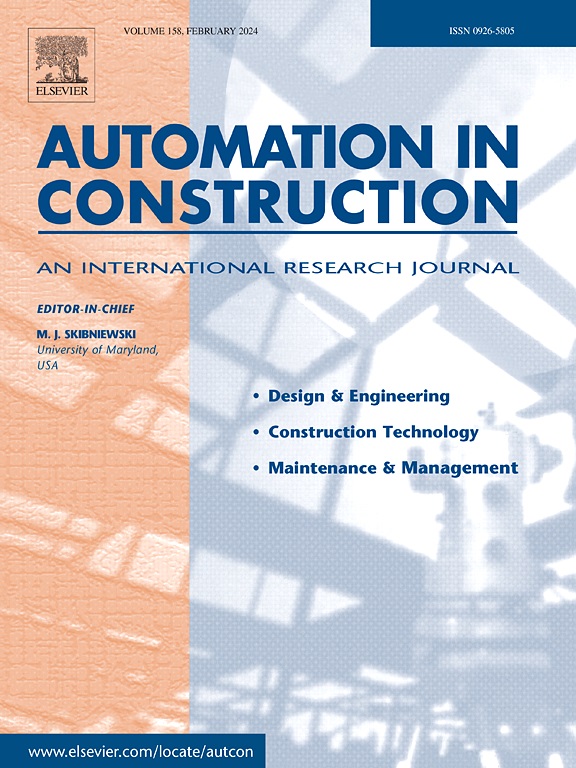基于上下文感知深度估计的同质室内环境三维重建
IF 11.5
1区 工程技术
Q1 CONSTRUCTION & BUILDING TECHNOLOGY
引用次数: 0
摘要
在建筑、工程和施工(AEC)行业,3D重建对于施工管理、室内导航和能源性能分析等应用至关重要。然而,室内环境的特点是无纹理的表面和不同的照明条件,这给传统的重建方法带来了巨大的挑战,难以有效解决。为了解决这些问题,本文提出了IndoCAFE-Net,这是一个基于深度学习的多视图立体(MVS)框架,旨在提高室内3D重建的准确性和完整性。IndoCAFE-Net在室内特定的IndoReal-MVS数据集上进行训练,该数据集捕获复杂的室内现象,如动态照明和均匀区域,IndoCAFE-Net集成了上下文感知特征增强(CAFE)块和双损失优化策略。与现有模型相比,该模型的精度为4.70 mm,完整性为5.20 mm,有效点(RIVP)分数的相对改进为265.16%。这些结果突出了IndoCAFE-Net在推进室内3D重建方面的潜力,为AEC行业的设施管理和资产优化提供了强大的解决方案。本文章由计算机程序翻译,如有差异,请以英文原文为准。
Context-aware depth estimation for improved 3D reconstruction of homogeneous indoor environments
In the architectural, engineering, and construction (AEC) industry, 3D reconstruction is crucial for applications such as construction management, indoor navigation, and energy performance analysis. However, indoor environments, characterized by textureless surfaces and varying lighting conditions, pose significant challenges that conventional reconstruction methods struggle to address effectively. To tackle these issues, this paper proposes IndoCAFE-Net, a deep learning-based Multi-view Stereo (MVS) framework designed to enhance the accuracy and completeness of indoor 3D reconstructions. Trained on the indoor-specific IndoReal-MVS dataset, which captures intricate indoor phenomena such as dynamic lighting and homogeneous areas, IndoCAFE-Net integrates a Context-Aware Feature Enhancement (CAFE) block and a dual-loss optimization strategy. It achieves an accuracy of 4.70 mm, completeness of 5.20 mm, and a Relative Improvement in Valid Points (RIVP) score of 265.16 % over existing models. These results highlight IndoCAFE-Net's potential to advance indoor 3D reconstruction, enabling robust solutions for facility management and asset optimization in the AEC industry.
求助全文
通过发布文献求助,成功后即可免费获取论文全文。
去求助
来源期刊

Automation in Construction
工程技术-工程:土木
CiteScore
19.20
自引率
16.50%
发文量
563
审稿时长
8.5 months
期刊介绍:
Automation in Construction is an international journal that focuses on publishing original research papers related to the use of Information Technologies in various aspects of the construction industry. The journal covers topics such as design, engineering, construction technologies, and the maintenance and management of constructed facilities.
The scope of Automation in Construction is extensive and covers all stages of the construction life cycle. This includes initial planning and design, construction of the facility, operation and maintenance, as well as the eventual dismantling and recycling of buildings and engineering structures.
 求助内容:
求助内容: 应助结果提醒方式:
应助结果提醒方式:


